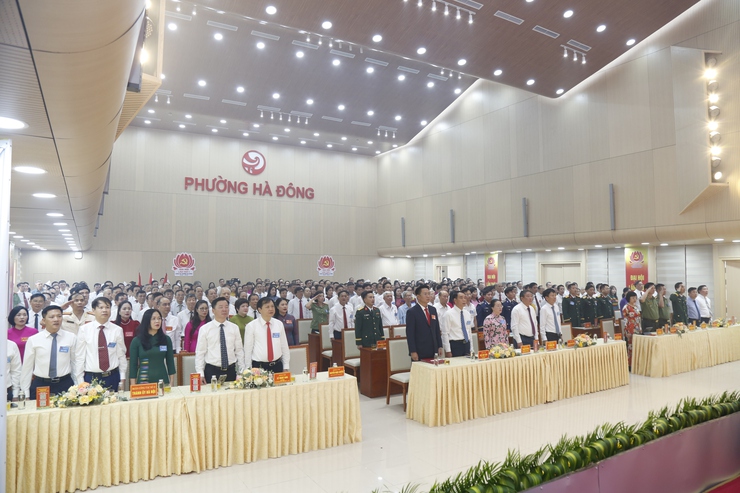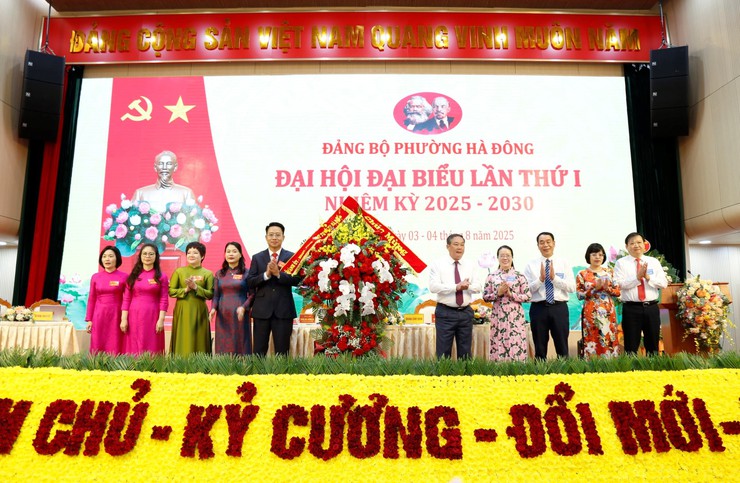The event welcomed several key figures, including Nguyen Van Tung, Director of the Department of Local Affairs I under the Central Organization Commission; Ngo Van Hai, Director of the Department of Digital Transformation and Cryptography at the Office of the Party Central Committee; and Le Hong Son, Member of the Standing Committee of the Hanoi Party Committee and Standing Vice Chairman of the Hanoi People's Committee, who also leads the Party Committee's Task Force No. 11.

Overview of the event.
Also attending were leaders from various departments and agencies of the city, along with 239 official delegates representing over 14,800 Party members of the Ha Dong Ward Party Committee.
In his opening address, Nguyen Thanh Xuan, Secretary of the Ward Party Committee and Chairman of the Ha Dong Ward People's Council, stated that the congress's theme is: "Building a clean and strong Party Committee; improving the performance of the political system; promoting the power of great national unity; developing Ha Dong Ward into a civilized, modern, and sustainable locality."
The congress was tasked with reviewing the implementation of the resolution from the 2020–2025 term, setting development viewpoints, goals, strategic breakthroughs, key tasks, and specific solutions to guide the Party Committee's leadership for the 2025–2030 term.
Delegates also discussed and contributed to draft documents from the Party Central Committee for the 14th National Party Congress, as well as the draft Political Report by the Hanoi Party Committee for its 18th Congress.
According to the political report presented by Doan Thi Hoa, Standing Deputy Secretary of the Ha Dong Ward Party Committee, the ward achieved several positive outcomes across many areas between 2020 and 2025, despite numerous challenges.
During this period, the ward's economic growth remained steady, with an average annual increase of over 10 percent, surpassing planned targets. State budget revenue rose consistently each year. Budget spending was tightly managed, with priority given to social welfare, education, healthcare, infrastructure upgrades, and digital transformation.
Land management and site clearance efforts were implemented decisively. Urban planning, construction, and management followed the principles of civilization and modernization. Environmental protection, disaster prevention, rescue operations, and climate change adaptation received considerable attention.
The ward actively promoted culture, physical education, and sports while fostering the image of a graceful, civilized Hanoi citizen. Education and training advanced significantly in both scale and quality, contributing to a stronger workforce. The quality of life for residents improved, and social welfare was ensured. The ward maintained political security, public order, and a solid foundation for national defense closely aligned with public security strategies.
Party building and organizational work were consistently prioritized. Inspection and oversight activities were enhanced, improving transparency and compliance with Party principles. Violations were strictly addressed, helping to prevent and reduce ethical and behavioral decline among officials and Party members. The People's Council's performance improved, while the Ward People's Committee strengthened its administrative capacity. The Vietnam Fatherland Front and socio-political organizations operated with increasing effectiveness.
The congress outlined the major development targets for 2030, including seven targets related to Party building and eleven on socio-economic development. These include ensuring that at least 90 percent of Party organizations and members complete their tasks well each year. In terms of socio-economic targets, the ward aims to meet 100 percent of its annual budget revenue targets and achieve an average revenue growth rate of 8 to 10 percent from 2025 to 2030, excluding land use fees.
The ward plans to maintain zero poverty and near-poverty households. It also aims for 92 percent of households to be recognized as "Cultural Families" and 88 percent of residential groups as "Cultural Neighborhoods."
The congress also identified six key tasks, three strategic breakthroughs, and a set of synchronized solutions to ensure comprehensive, prosperous, modern, and sustainable development for Ha Dong Ward.

Delegates at the event.
In his remarks, Le Hong Son, Member of the Standing Committee of the Hanoi Party Committee and Standing Vice Chairman of the Hanoi People's Committee, praised the achievements of the ward's Party Committee and residents in recent years. He noted that Ha Dong Ward holds strong geographic and human capital advantages, with many universities and a high-quality workforce.
However, he said rapid urbanization has created new challenges that the ward must address while aiming for high double-digit growth targets. Issues related to land and urban planning must be resolved in tandem with economic, tourism, trade, and service development that also preserve and promote cultural values and improve the quality of life for residents.
Regarding the three breakthrough areas, Vice Chairman Son emphasized the ward's cultural industry development as a suitable focus. He instructed the ward to expand digital transformation beyond administrative tasks, calling for data standardization and robust implementation of level-4 public services. In promoting digital society, he urged the ward to set specific targets for digital literacy programs and to focus on digital economy integration.
With more than 13,000 households and businesses, Ha Dong should support them in adopting digital platforms for transactions and operations. Innovation should be encouraged through projects involving students and parents, with the creation of innovation spaces and infrastructure.
For Van Phuc Silk Village's cultural industry development, he recommended dividing the area into commercial, shopping, lodging, and dining zones. Without proper lodging and dining facilities, tourism potential will not be fully realized. Following the congress, he hoped the city would receive a comprehensive development proposal for the craft village, aligning with cultural industry and tourism goals.
Nguyen Thanh Xuan, Secretary of the Ward Party Committee and Chairman of the Ha Dong People's Council, acknowledged the Vice Chairman's guidance. The congress adopted a resolution with six task groups, three breakthroughs, four programs and projects, and two solution groups to guide implementation through the 2025–2030 term.
In his closing remarks, Secretary Xuan stated that the success of the First Party Congress of Ha Dong Ward reflects thorough preparation, discipline, and broad democratic participation in line with directives from the central and municipal Party committees.
He said the success of subordinate Party congresses also showcased the intellect and engagement of officials, Party members, and the public, who contributed significantly to the ward's political report and other key documents for the 18th Congress of the Hanoi Party Committee and the 14th National Party Congress.
The congress also announced the Party Committee's new leadership appointments as designated by the Hanoi Party Committee. The new Party Executive Committee comprises 23 members. Nguyen Thanh Xuan was appointed as Secretary of the Party Committee and Chairman of the People's Council. Doan Thi Hoa was named Standing Deputy Secretary, and Tran Thi Luong An was appointed Deputy Secretary and Chairwoman of the Ward People's Committee. The congress selected nine delegates to represent the ward at the 18th Congress of the Hanoi Party Committee.